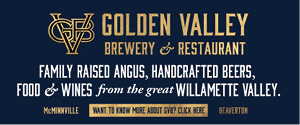Case of Sour Grapes?
By Terry John Gibson
Had my Culture and Commerce of the Oregon Wine Industry class from Marylhurst University not gone on a field trip that weekend, this commentary may not have even happened, let alone been written in time to make this edition.
Our professor, Mike Randolph, had given our small class a variety of materials: videos, lecture, exercises and numerous handouts covering Oregon wine industry history, its unique environment, marketing challenges, terroir, the various types of grapes grown here, especially the state’s flagship, Pinot Noir. On this particular day, Randolph distributed the latest August OWP to everyone on the trip.
As we left the Argyle tasting room in Dundee, I was able to peruse this latest issue and was pleased to see that the Oregon wine industry was maintaining its leadership in innovation, collaboration and sustainability. However, the commentary by guest columnist Kevin Chambers, of Oregon Vineyard Supply, seemed to represent the lone voice pushing back against what he considered to be some rather extreme views in the industry regarding Biodynamics, organics and sustainability.
One paragraph stood out, indicating to me that, perhaps, proponents of conventional agriculture simply do not understand what sustainability means.
Chambers wrote: “Finally, virtually nowhere in the ‘green’ movement do I see discussions of the sustainability of labor and economics. Virtually all the organically approved methods are labor intensive and don’t address the economic burden whatsoever. It’s as if people and their plight don’t factor into these discussions.”
Of course the irony that the business Mr. Chambers works for sells conventional agricultural chemicals was not lost on me either; although, I noticed while looking at the OVS website that they also participate in organic and sustainable vineyard support.
As a recent study titled “Enhancing the Ecosystem Services in Viticulture: Approaches toward a Sustainable Management” by Italian researchers (Lamastra, Fragoulis, Trevisan and Capri, 2010) points out, sustainability was first coined in 1987 as a concept to be applied to development and, by logical extension, to agriculture. The triple bottom-line concept of sustainability introduced to me in Marylhurst University’s MBA of Sustainable Business program was characterized in a number of catchy phrases: people, planet, profit; sociology, ecology, economy; social justice, environmental protection, economic equality; and socially equitable, environmentally sound, economically feasible. The program made it clear that profit-driven businesses externalize the true cost of labor and the impacts to the ecosystem that sustainable businesses take into full account. Profit-driven business maximizes profit for itself by thrusting the impacts of resource extraction, physiological costs, and waste disposal onto someone else, somewhere else. However, the most important concept is that sustainability is a journey, not a destination.
In the original Brundtland Commission definition of sustainability, which states that it “meets the needs of the present without compromising the ability of future generations to meet their own needs,” the word “compromising” stands out as the standard by which today’s actions should be measured when discussing sustainability. One point frequently raised in the MBA program was that organic and Biodynamic are not progressive when compared to conventional practices that started after World War II factories were easily converted from making armaments to producing fertilizers and pesticides.
As guest columnist Jeffrey Weissler points out on the facing page in the same issue of OWP, Biodynamics, organics and, by extension, sustainability represents a return to traditional husbandry of resources that are renewable only if they are maintained as part of the system that we ourselves depend on for our own survival as a species.
The “so-called” green revolution had as much to do about how to capitalize the existing industrial infrastructure left over from the war as it was about revolutionizing agriculture. The point is not saving some exotic mega-fauna or tiny fish very few of us have heard of or will never go see in person, we are saving ourselves.
The natural environment developed with humans as a key factor; but we are only one of multitudes, many of which proponents of conventional agriculture decided were not crucial elements of a complicated system that allowed the human race to achieve the soaring accomplishments evident today, such as the Willamette Valley Pinot Noir industry. Sustainability values those multitudes because that is what creates terroir; and terroir is what Willamette Valley Pinot Noir is all about.
Terry John Gibson is a landscape architect in Jennings Lodge. He earned an MBA of Sustainable Business with a concentration in Natural and Organic Resources from Marylhurst University.












